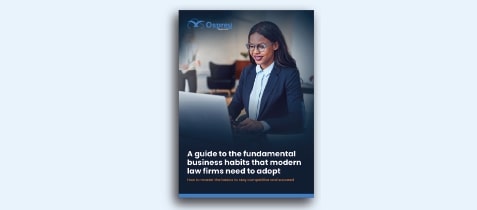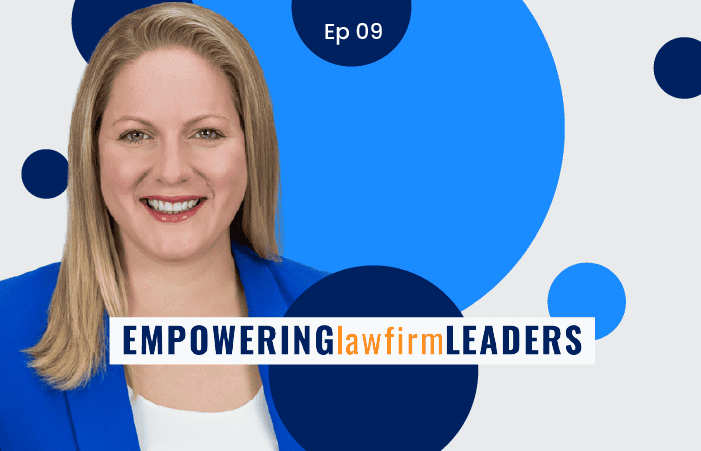Contents
The law firm of the future: How to prepare for success
In this conversation, Chris Bull, consultant at Edge International and former COO for Osborne Clarke, shares his predictions of what a law firm will look like in 2030, along with practical advice for how to prepare for success.
In episode 11 of the Empowering Law Firm Leaders podcast, Chris discusses the changes and innovations he expects across the sector in the future and how that impacts SME firms now, as well as the most effective way to spend your tech budget and maximise ROI.
In this conversation we cover:
- The impact of the legal operations role
- How to spend your IT budget
- Large law practices to inspire SME firms
- How to encourage experimentation and innovation
- What to prioritise to thrive in 2030
Chris’s three essentials for running a successful modern law firm
- A client-centric approach
While many firms claim to prioritise their clients, Chris highlights the need for a deeper commitment: “Being client centric is different… [it’s] about being obsessed by the client, your current clients, your future clients, how they’re evolving, what they really want, what success looks like for them.” Chris challenges firms to measure their success not just by financial metrics but by the value they add to their clients.
- A restless, radical, and challenging mindset
Chris advocates for a mindset that is restless, radical, and challenging. He believes that law firms must constantly question the status quo and be willing to innovate and adapt. “Take nothing for granted. Never say we’ve always done it this way, never say we’re lawyers and we’re different and we can’t do it the way other businesses can do it,” Chris advises.
- Have a unifying purpose
Chris highlights the importance of having a clear, shared purpose that aligns with the firm’s values and goals. This purpose should guide all aspects of the firm’s operations, from client interactions to internal processes. Chris notes that purpose can sometimes be dismissed as superficial, however, he argues that purpose is fundamental and should lead to profit, not be balanced against it. “Understand your purpose. Engage people with it. Get people enthused by it. Live by it, do it well and profit will be the consequence of that,” Chris explains.
The impact of the legal operations role in the law firm of the future
The legal ops role involves innovation, transformation, client technology, and legal tech. Legal ops professionals now play a crucial role in applying technology to legal services, creating bespoke tech solutions for clients, and driving overall efficiency and innovation within firms.
Legal ops roles are now seen as a viable and attractive career path, not just for lawyers but also for technologists and professionals from other disciplines. Chris describes this evolution as “a real career path, whether you’re a lawyer, whether you’re a technologist, whether you’re coming in from outside with some other discipline.” This shift has created a competitive environment for talent; Chris highlights that smart and aware firms recognise the value these individuals bring, particularly in running a law firm efficiently on a restricted budget.
For smaller firms (SMEs), integrating legal ops can be challenging due to limited resources. Chris acknowledges this, noting that in many SMEs, roles such as practice managers or office managers often encompass multiple responsibilities.
Overall, the impact of legal ops on law firms is profound. These roles are at the forefront of changing how legal services are delivered, driving efficiency, innovation, and client satisfaction. Chris concludes, “They’re the key problem solvers in the industry, and they’re the people who are going to shake stuff up.”

About Chris Bull
Chris Bull has been a prominent figure in the legal sector for over 25 years. His career spans various senior leadership positions, including Chief Operating Officer for Osborne Clarke and roles with several UK global law firms. In 2021, Chris published his first book, The Agile Law Firm: “[The book] was an attempt to do what we’re talking about today, which is to try and consider what a law firm will look like 2030 and what things firms need to be thinking about and addressing now.”
Chris’s expertise lies in strategy, change, and transformation, with a particular focus on integrating technology and process improvements in law firms. As a principal at Edge International, he continues to advise firms on how to navigate the complexities of the modern legal environment.
How SME law firms should spend their IT budget
Both the LPM Frontiers and Lexis Nexis Bellwether reports show that many SMEs will be increasing tech spend in the coming 12 months, but how should firms be spending their budget to maximise return on investment (ROI)?
Chris believes that the increase in tech spend may simply be a reflection of increasing costs: “Everything is more expensive and tech is a lot more expensive. I mean, particularly I think the SaaS model is driving quite a lot of year-on-year costs.”
Artificial intelligence (AI), particularly generative AI, is another major factor influencing tech budgets. Chris highlights that AI, including tools like Microsoft’s Copilot, will significantly drive law firm budgets in the coming years. He mentions, “AI will be the big driver of law firm budgets because fundamentally Copilot… is going to cost you more money.” Despite the costs, Chris believes that firms will invest in these technologies because of their potential to augment capabilities, especially for smaller firms that cannot afford large teams.
Additionally, there is growing interest in practice-specific tools and technologies. Chris notes that while generic enterprise software offers consistency and economies of scale, there is a recognition that different areas of practice, such as private client work and commercial law, require tailored solutions. He observes, “We’re all starting to say that private client work and family and company commercial and employment are different and they’re done in different ways.”
Business intelligence and analytics tools are also areas where firms are spending money, as the tools provide valuable insights and information. Chris acknowledges that while there is a risk of falling for AI hype, starting with trusted products and enhancing them with AI is a sensible approach.
How SME law firms can improve ROI on technology
It starts by setting clear objectives and measures for legal tech projects to ensure they deliver tangible benefits. Chris advises firms to define what they aim to achieve with each project and to set specific financial improvement measures. For example, implementing a practice management system should lead to better revenue management, reduced write-offs, and faster cash collection. Chris states, “[Always determine] what you’re trying to achieve here and then set a measure against each one.”
Productivity is another critical area. Chris challenges the traditional notion that productivity in law firms is measured by more chargeable hours. Instead, he advocates for measuring productivity in terms of better value and less time spent on tasks. He explains, “Law firms are measuring productivity based on people spending more time on things. The rest of us are measuring productivity as better value, less time. Less time is good.”
Chris suggests that firms should measure the time saved by users through enhancements and upgrades to technology or processes. This can be done through questionnaires and control tests to determine how much time per week is given back to users. He notes, “People love to know they’ve had X hours back. What they do with those hours, that’s a separate question.”
Client satisfaction and retention are also crucial metrics. Chris argues that every project should have a client-focused objective, asking, “In what way will this improve the client experience, the client journey, the client satisfaction, and the sense they have of value?” He stresses the importance of defining these objectives upfront and ensuring projects are not solely internally focused.
Large law practices that can be adopted by SME firms to improve long-term success
Both large and small law firms can learn from each other, particularly in terms of mindset and strategic focus. He notes that larger firms, especially in the UK, have adopted more commercial approaches, often radically changing their models and being ambitious. Chris suggests that SMEs can look at larger firms for inspiration, particularly in how they think about growth and purpose.
Chris emphasises that size isn’t everything and that there are significant costs associated with running a large firm. He highlights the advantages smaller firms have in terms of agility and decision-making. Smaller firms can pivot and make changes more easily than larger firms, which often feel more conservative. Chris advises, “It’s a lot easier for you to make this call, make a decision, change direction, take action.”
AI and other technologies play a crucial role in bridging the resource gap for smaller firms. Chris explains that while AI is not free and can be expensive, it offers a cost-effective way to augment human resources. He notes, “AI is going to make a big difference to that. It won’t level the playing field for large firms who have AI too, but it can make your firm much more capable of delivering in the modern kind of the era.”
Chris encourages smaller firms to leverage their agility and the potential of AI to compete effectively with larger firms. By adopting a strategic mindset and embracing new technologies, SMEs can enhance their capabilities and thrive in the competitive legal landscape.
How to encourage experimentation and innovation at your firm
Leadership plays a crucial role in fostering change and innovation within law firms. He notes that while there are champions and advocates for change throughout firms, it is essential for leaders to actively support these initiatives: “The people at the top have to be positive about change.”
Chris advises senior leaders to delegate and empower others within the firm to take the lead: “Encourage those people from wherever they are in your firm, your organisation, and really try hard not to discourage them or restrict them.”
Chris believes that current training budgets are often insufficient, and there is a lack of focus on helping individuals become effective users of technology and managers of their own time. Chris stresses the importance of investing in training that enhances personal effectiveness and skills such as design thinking and the concept of a minimum viable product (MVP). He explains, “We must help people become really good users of technology. Really good managers of their own time and their own life.”
A significant barrier to innovation is the lack of time and incentives for these individuals. Chris points out that many good initiatives fail because people are too focused on client work and meeting chargeable hours. He explains, “They just don’t have time and they’re not rewarded or incentivised.” Firm leaders need to address this by allocating time and resources to support these champions of innovation.
Future-proofing your firm to ensure long-term success
Chris advises law firms to think strategically about their future by envisioning where they want to be in 2030 and working backwards to determine the necessary steps to get there. He suggests that firms should ask themselves critical questions related to their purpose and mission: “What do you need to be and what do you want to be in 2030?”
It’s important to balance day-to-day operations with strategic planning. Chris explains, “We’re all naturally programmed to go, ‘what have I got to do today? What have I got to do this week?’ ” However, he stresses the importance of planning backwards from the future goal to manage the necessary steps needed to complete today to help your future. While 2030 may seem far off, it is close enough for firms to start planning now. This involves considering expansions, new offices, rebranding, and adding new services, all of which take time and require immediate action.
Chris concludes that firms must decide on their 2030 aspirations quickly and work backwards to ensure they are on the right path. This approach helps firms stay focused on their long-term vision while managing the practicalities of achieving it.
Preparing for the future of law
By adopting a client-centric approach, fostering a restless and challenging mindset, and unifying the firm with a clear purpose, law firms can navigate the complexities of the modern legal landscape. The evolving role of legal operations, strategic investment in technology, and the importance of performance management are crucial elements that firms must embrace to drive efficiency, innovation, and client satisfaction.
Chris’s emphasis on learning from other sectors, leveraging AI, and encouraging innovation highlights the need for law firms to be agile and forward-thinking. By planning strategically for 2030 and working backwards to identify necessary steps, firms can ensure they are well-prepared to meet future challenges and opportunities.
Watch the full interview with Chris Bull now to discover more advice and guidance on preparing for success. You’ll also hear Chris’s exclusive advice on the importance of purpose and how it unifies and drives teams.





